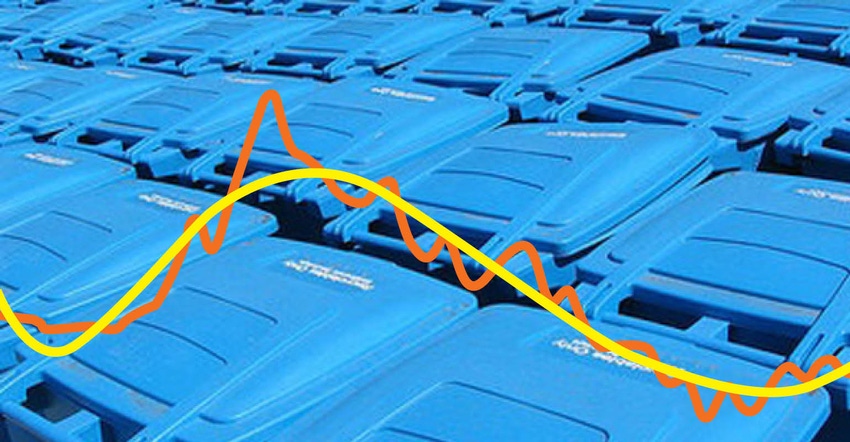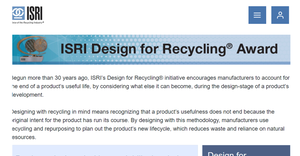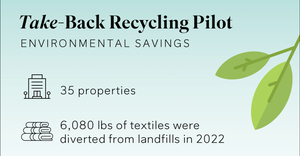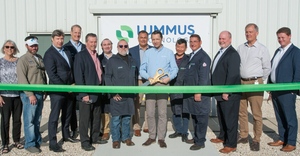Work Green Howard County recognizes businesses reporting recycling rates with certificates from the county executive and a window decal.

As it strives to reach Maryland’s statewide goal of reaching zero waste by 2030, Howard County is working with businesses by offering incentives on the reporting of recycling numbers.
Overall, the county’s diversion rate stands at 50 percent, which is ahead of the overall state figure of 30 percent. But it sees recycling at businesses as crucial to continue to make gains. That’s because businesses generate 75 percent of the waste in the county, according to Alan Wilcom, the recycling program manager, for Howard County’s public works department.
“It’s voluntary for them to report to us,” Wilcom says. “We are trying to adopt programs hoping to incentivize them to recycle more while enabling us to capture numbers of those who are already doing it,”
It instituted Work Green Howard County, to recognize businesses reporting recycling rates with certificates from the county executive and a window decal. It’s also simplified the reporting form, whittling down the list of waste categories from about 60 to 10 that businesses use most.
Wilcom anticipates benefits of the program both for the companies and the county whether to provide resources to help companies increase diversion and efficiency, or strengthen the county from a sustainability and economic perspective.
Goals of reporting include helping identify trends and needs, providing a tool to develop best practices, and documenting outcomes. Ultimately, hopes Wilcom, it will support economic development.
“If a food waste generator was considering siting a plant in our area, our economic development authority can say, we have infrastructure and documentation that other companies are doing it,” Wilcom says.
Nestle Dreyer Ice Cream, in the county’s Laurel area, has reported recycling since 2009 and has been landfill-free since 2014, recycling some streams and sending others to energy recovery.
“[The county program] doesn’t change what we are doing from a reporting stand, but by participating in Work Green we help increase awareness of the county’s recycling goal,” says Shane Bauer, facility environmental specialist for Nestle Dreyer.
The initiative is good for the company too. Over the past couple of years its recycling program has leveled out at about 50 or 60 percent and they’d like to send more to recycling than energy recovery.
“We need as many opportunities as are available to educate our employees to get to where we want to be … and it enables us to tell them that it’s not just Nestle working on these goals; it’s our whole community,” says Bauer. “The Howard County program posts business participants’ names and recycling activity information. So we can show our employees we are reducing environmental impact. If we can develop these behaviors at work they can take those behaviors home and teach their children.”
Bauer is waiting to see how the county program evolves.
“I’m curious to see if there will be summits or meetings for businesses to get together and talk about recycling tips or new opportunities to repurpose,” he says. “Maybe I can’t use a material but another local company can, so I could start networking to further develop a circular economy.”
Jacksonville, Fla.-based waste expense management company Cass Information Systems provides services and reporting tools for businesses, including in Howard County, to support those entities in reaching recycling goals. Good reporting and education go hand in hand, says Gary Nutter, the company’s vice president of sales and marketing.
By benchmarking company’s rates they begin with a baseline and use the data to work toward increasing their diversion. Cass uses the metrics to develop training and education materials; and improve efficiency.
“We help employers develop best practices using reporting material. They are learning what products should be recycled and how to educate their stakeholders,” says Nutter.
The Center for EcoTechnology, a nonprofit facilitating business, government, and residential waste reduction services, sees that once businesses start paying close attention firms become adept at creating efficiencies and reducing waste, says Lorenzo Macaluso, the Center’s director of client relations.
Among examples he cites is a supermarket wholesaler and distributor that started composting.
“When they began, they got more detail about their overall food waste, realizing this is a lot of material we are throwing away, whether as trash or compost,” Macaluso says. “They realized they could prevent some of it from going to compost in the first place through operational changes like improving their storage and order fulfillment. In the end, they were salvaging food and able to sell it.”
Howard County plans to ramp up its program next year with tier winners and award ceremonies.
“We hope to increase business recycling reporting by 10 to 20 percent over the next two years … and to exceed required state and county recycling goals,” says Wilcom.
About the Author(s)
You May Also Like




